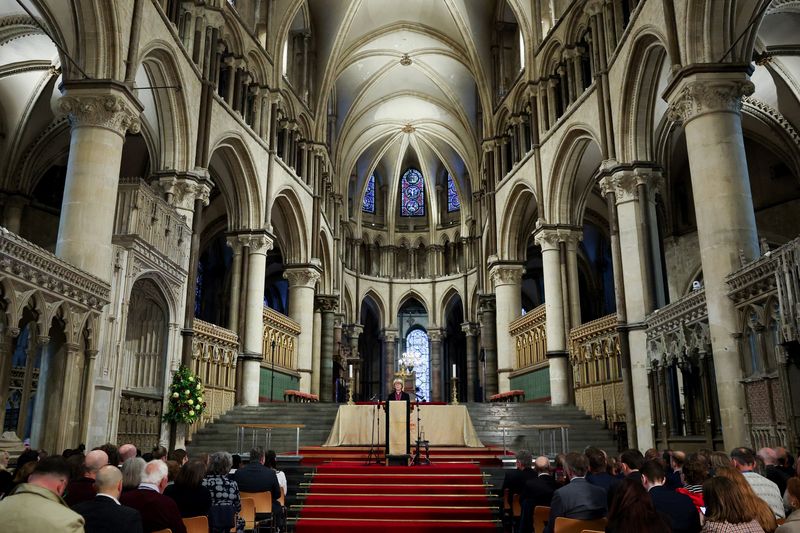By Muvija M
CANTERBURY, England (Reuters) -The Church of England named Sarah Mullally on Friday as the next Archbishop of Canterbury, the first woman to hold the 1,400-year-old office, prompting immediate criticism from conservative Anglican churches in Africa who oppose women bishops.
The 63-year-old former nurse will become the ceremonial head of 85 million Anglicans worldwide and, like her predecessors, will face a Communion divided between conservatives and more liberal Christians in the West over the role of women in the Church and over same-sex couples.
Laurent Mbanda, archbishop of Rwanda and chairman of a global grouping of conservative Anglican churches, told Reuters the appointment made it impossible for the Archbishop of Canterbury “to serve as a focus of unity within the Communion”.
MULLALLY HAS CHAMPIONED LIBERAL CAUSES
Bishop of London since 2018, Mullally has previously championed blessings for same-sex couples – a major source of contention in the global Anglican Communion, with homosexuality outlawed in some African countries.
Mullally said in an address in Canterbury Cathedral on Friday that she would seek to help every ministry to flourish, “whatever our tradition”.
She also said she wanted the Church to tackle the misuse of power after sexual abuse scandals and safeguarding issues, and she condemned rising antisemitism following an attack on a synagogue in Manchester on Thursday which killed two men.
Asked by Reuters in an interview on Friday about same-sex relationships, Mullally said the Church of England and the broader Anglican Communion have long wrestled with difficult issues.
“It may not be resolved quickly,” she said.
Reforms introduced more than a decade ago have made it possible for a woman to become the 106th Archbishop of Canterbury. It is one of the last British institutions to have been run until now only by men.
But those reforms have been rejected by many churches in Africa and Asia.
SAFEGUARDING IMPROVEMENTS NEEDED
Mullally will replace Justin Welby, who resigned over a child abuse cover-up scandal and who was criticised by many conservative Anglicans for taking an activist role on social issues.
She said on Friday she would focus on improvements in safeguarding, saying: “My commitment will be to ensure that we continue to listen to (abuse) survivors, care for the vulnerable and foster a culture of safety and well-being for all.”
Mullally spoke in her cathedral address of the difficulties of an age which “craves certainty and tribalism” and a country which is wrestling with complex moral and political questions around migration and communities feeling overlooked.
“Mindful of the horrific violence of yesterday’s attack on a synagogue in Manchester, we are witnessing hatred that rises up through fractures across our communities,” she said, adding that it was her Christian faith that gave her hope in a world which often feels “on the brink”.
Mullally is an outspoken opponent of legislation that would allow assisted dying which is currently progressing through Britain’s parliament.
She has called efforts to allow terminally ill people to end their lives with medical help “unworkable and unsafe” and said it poses a risk to the most vulnerable in society.
‘IT’S ALL ABOUT PEOPLE’
Mullally is a former cancer nurse who worked as England’s Chief Nursing Officer in the early 2000s, while also being ordained as a priest in 2002.
“There are great commonalities between nursing and being a priest. It’s all about people, and sitting with people during the most difficult times in their lives,” she once told a magazine.
Linda Woodhead, professor of theology and religious studies at King’s College London, said the Church needed Mullally’s strong management skills.
“Her emphasis on unity, gentleness and strength is exactly what the Church, and nation, needs right now,” she said.
Married to Eamonn and with two adult children, Mullally became one of the first women to be consecrated as a bishop in the Church of England in 2015.
Reflecting the Church of England’s status as the country’s established church, the appointment was announced by Prime Minister Keir Starmer’s office, with the formal consent of King Charles.
As monarch, Charles is the Supreme Governor of the Church of England, a role established in the 16th century when King Henry VIII broke from the Catholic Church.
(Reporting by Muvija M, writing by Sarah YoungEditing by Gareth Jones)

